CHOOSING YOUR CAREER
What path will you follow after school?

UNWIND AND RECHARGE

Looking after your wellbeing during stressful times



Discover




SCOTLAND’S NUMBER ONE STUDENT MAGAZINE AUTUMN / WINTER 2023 sourcemagazine.org.uk
how you could volunteer or study overseas
GOING ABROAD



































































IDEAS | PEOPLE | TRUST
Whether you have been counting down the days until autumn or you dread the arrival of winter, the shorter days and cooler temperatures have officially arrived. The countdown to the festive season can mean that there’s a lot to look forward to, but this time can also feel stressful for young people. As we head towards the end of the year, the pressure is on to think about your next steps: choosing your subjects, deciding what path to follow after school and finding time to unwind in the midst of it all can come creeping up on you.
Don’t fret: the Source team are here to help. Inside this issue, we’re helping you plan and prepare for life after school. Discover different career paths; whether college is right for you or if an apprenticeship would be a better fit; get money advice before you head to higher education; find tips to boost your self-esteem. Plus, we’re giving you tips on the best ways to de-stress and tackle isolation. All of this and loads more inside.






www.sourcemagazine.org.uk



www.sourcemagazine.org.uk 3 // welcome
PUBLISHER Denise Connelly denise@dcpublishing.co.uk EDITOR Emma Storr emma.storr@dcpublishing.co.uk EDITORIAL CONTRIBUTORS Kate Stevenson DESIGN AND PRODUCTION Lucy Baillie lucy.baillie@dcpublishing.co.uk SALES Marian Mathieson marian.mathieson@dcpublishing.co.uk
DC Publishing Ltd, 198 Bath Street, Glasgow, G2 4HG Tel: 0844 249 9007 SourceMagazine @SourceMag @source.magazine Editor SCOTLAND’S NUMBER ONE STUDENT MAGAZINE
©DC Publishing Ltd 2023. All rights reserved. No part of this publication may be reproduced or used in any way without prior written permission from the publisher. The views expressed in this magazine are not necessarily those of DC Publishing Ltd. The publisher takes no responsibility for claims made by advertisers within the publication. Every e ort has been made to ensure that information is accurate; while dates and prices are correct at time of going to print, DC Publishing Ltd takes no responsibility for omissions and errors. Inside this issue, we’re helping you plan your next steps Emma contents STUDY 9 BREAKING BOUNDARIES Finding self-belief and achieving your dreams. 12 TACKLING THE UCAS PROCESS Everything you need to know about your application. 14 EXPLORING THE PATH TO COLLEGE Could college be the right fit for you? 23 TIME TO STUDY ABROAD Learn how you can go overseas in the absence of the Erasmus programme. LIFE 4 DATES FOR YOUR DIARY Stay on track this school year. 25 WHY VOLUNTEER Develop your skills whilst helping others. 28 ACCOMMODATION: STUDENTS IN CRISIS We investigate the issue facing Scotland’s young people. MONEY 11 MASTERING YOUR MONEY Take control of your finances. WORK 6 CHOOSING YOUR PATH Deciding what you will do next. 17 WHY CHOOSE AN APPRENTICESHIP Combine earning and learning after you leave school. PLAY 30 UNWIND AND RECHARGE Reducing stress as you consider your next steps. HEALTH 20 COPING WITH LONELINESS How you can tackle feelings of isolation. 11
dates for your diary
Stay on track with your school schedule using our helpful calendar

OCTOBER
10
WORLD MENTAL HEALTH DAY
Start a conversation with friends and remember it’s ok not to be ok.
16
UCAS DEADLINE
Today is the UCAS deadline if you are applying to Oxford, Cambridge, or for any medicine, veterinary or dentistry courses.
16-20
OCTOBER BREAK
Get ready to take a break before the countdown to the festive season begins.
NOVEMBER
DECEMBER
5
INTERNATIONAL VOLUNTEERS DAY
Build your CV or personal statement by giving back.
22
SCHOOLS CLOSE FOR CHRISTMAS
It’s time to celebrate the festive season with a well-deserved break.
25
CHRISTMAS DAY
Spend quality time with your family.
JANUARY
BONFIRE NIGHT
How will you be marking Guy Fawkes’ night?
6

5 13
NATIONAL STRESS AWARENESS DAY
Take time to learn about mindfulness and coping with stress at school.
ANTI-BULLYING WEEK
Learn about how to seek support in school.
BACK TO SCHOOL
Get ready, the new term has arrived.
8 31
UCAS DEADLINE
This is the cut off for the majority of Undergraduate and Conservatoire applications.
4 www.sourcemagazine.org.uk
// life
Always double check term dates for the council you live in
Future Awards Talent
Receive £1,500 per year for up to four years














We offer two scholarships; one for engineering students, apprentices and degree apprentices who have faced financial or personal challenges and the other is for high achieving students and degree apprentices with a passion for engineering.






Find out more: theiet.org/future-talent


The Institution of Engineering and Technology (IET) is registered as a Charity in England and Wales (No. 211014) and Scotland (No. SC038698). Futures Place, Kings Way, Stevenage, Hertfordshire SG1 2UA, United Kingdom.
CHOOSING YOUR PATH
As you head towards the end of your time at school, a big decision lies ahead: what will you do next?
www.sourcemagazine.org.uk 6
If you are in your last two years of school, it’s likely that you’ve already been asked what you want to do next multiple times. Whether these questions have come from your friends, your favourite teacher, a guidance counsellor or your family, there’s only one person that has the answer: you.
You might already know what you want to do after you finish school and the qualifications or experience you need to get there, but don’t worry if you aren’t sure yet: we’re helping you get inspired and rule out the careers that aren’t suited to you.
JOB SEARCH
Once you have an idea of the career or role you would like to pursue, it’s time to plan your entry into the world of work. This could involve getting a qualification or going into higher education to complete a degree in the topic, but if your path involves going straight into the workplace after school then there’s plenty of sites to help you get started. Before you start applying, you could attend a careers fair or speak to a careers advisor to discover the best way to get into your chosen career.
Job boards are one of the most effective ways to find jobs and show your skills to employers. Sites like Indeed (www.indeed.com) allow you to upload your CV and contact information so that it is quick and easy to apply if a relevant position comes up. LinkedIn (www.linkedin. com) is another great way to find job adverts and showcase your skills. Before you start applying, pack your profile with any skills, experience and qualifications you have.
If you aren’t in your last year of school yet, you could pursue work experience that is relevant to the role you want in the future, giving you the edge over the competition if you apply to a role straight after school. Maybe you have recently discovered what career path you
want to follow, or it’s something that you’ve known since you were young, but it’s equally valid if you aren’t quite sure what you want to do yet.
You have plenty of time to define your future, and remember you can always change your mind along the way if things don’t work out how you expected. The saying ‘there’s no wrong path’ has become popular for a reason, you could start out in a creative role and end up finding your passion in healthcare, or do something focussed on maths and want to switch to a role in the entertainment industry in the future.
STEM
GOOD FOR: People who love problem solving and think in an analytical way.
STEM careers encompass an incredible range of roles, covering science, technology, engineering and mathematics. You could pursue a career in tech and learn to code, become a structural engineer and provide a valuable service in society, or create the next tech gadget that everyone wants.
The possibilities in STEM are literally endless, and these careers could see you pursue something traditional, or a role that lets you innovate in your sector. Finding the right STEM role for you can be overwhelming, but luckily there’s a lot of support and organisations ready to help. STEM Learning (www. stem.org.uk) is a great resource to get you started.
HEALTH AND SOCIAL CARE
GOOD FOR: People who are empathetic and thrive on helping others.
There are more than 350 job roles in the health and social care sectors, some that you might be familiar with, and others that could surprise you. If you have a passion for helping others, this is the sector for you whether you want to be a nurse, a doctor, or work in administration scheduling important procedures and appointments.
The emergency services are a lifeline if you are in danger or need to help others during a crisis, but the real heroes are the individuals on the ground. Pursuing a career in the Scottish Fire and Rescue Service, the Scottish Ambulance Service or Police Scotland could see you save lives and help your community.
CREATIVE AND ARTS
GOOD FOR: People who are constantly brimming with new ideas.
Is your best subject at school English or Art, or do you spend your spare time honing new hobbies to keep your creative side satisfied? If so, a career in the creative industries or the arts could be the right fit for you. You could be bold and become an artist or pursue a role in an area like music production, or merge this passion with something more practical like becoming a museum assistant or a journalist. Careers in this area are often a chance to combine your personal passions with your career, opening the doors to a job you truly love. Now, more than ever, there are modern apprenticeships in this area to help.
FIND OUT MORE
Don’t hesitate to reach out for support if you aren’t sure what path to follow. Visit My World of Work (www.myworldofwork.co.uk) and Skills Development Scotland (www.skillsdevelopmentscotland.co.uk) to find out more.
www.sourcemagazine.org.uk 7 // WORK
The saying ‘there’s no wrong path’ has become popular for a reason

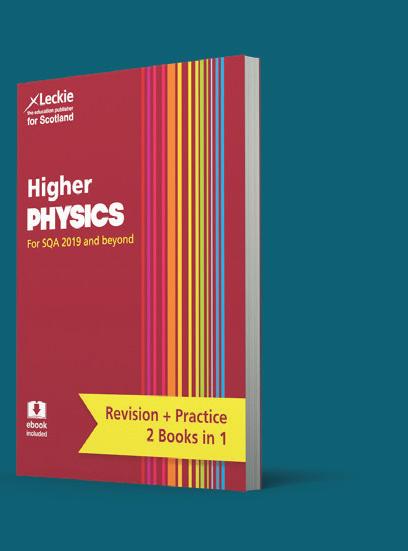

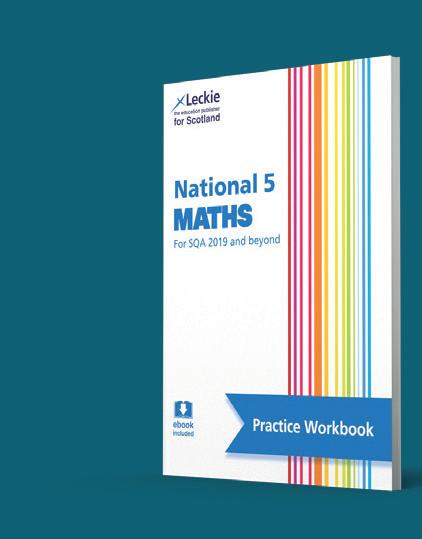
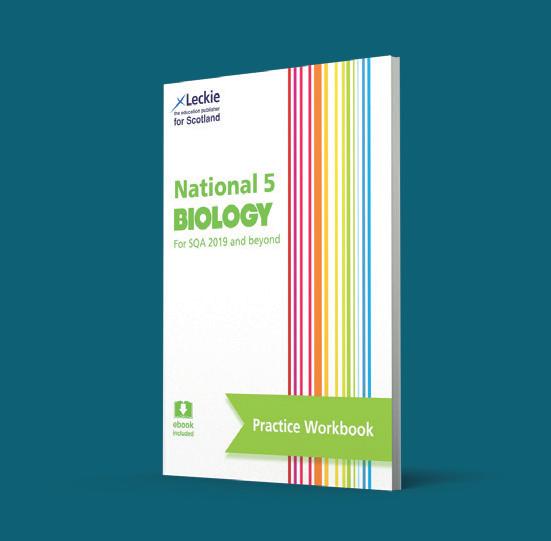








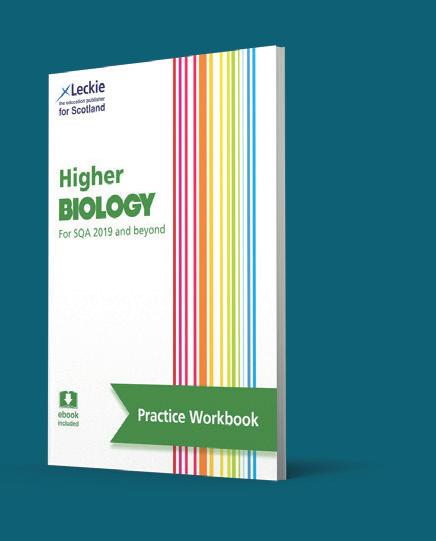











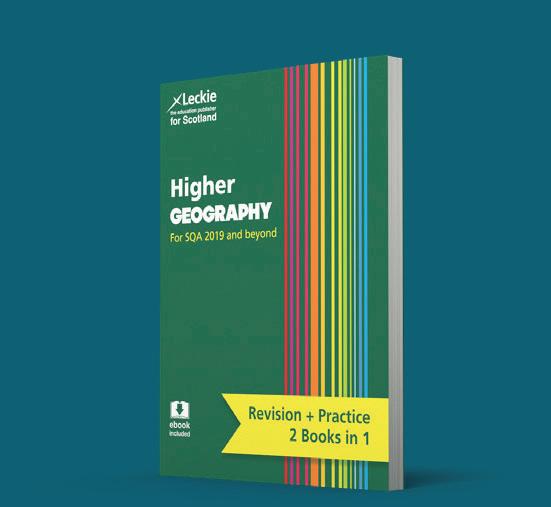














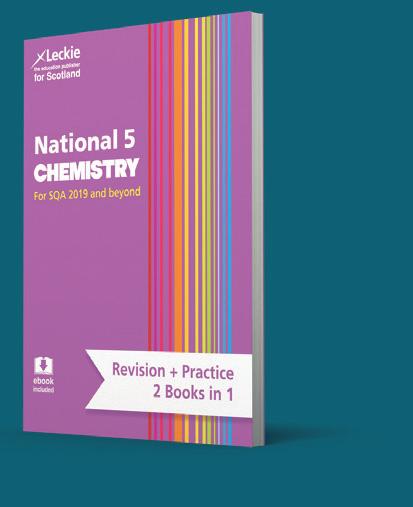







Complete Revision & Practice Study guides and practice papers combined From £10.99 Practice Workbooks Practice questions on every topic and a practice exam paper £7.99 Save 30% until Nov 1st Simply use the code Source23 at www.leckiescotland.co.uk
BREAKING BOUNDARIES
Building self-belief and confidence can help you follow the path to success, regardless of what other people think
As you head towards the end of your time at school, it’s easy to feel overwhelmed when thinking about your future. The weight of self-doubt and the opinions of others can sometimes hold you back, but the truth is, you have the power to shape your own path, no matter where you come from or what others say. It’s time to start believing in yourself in order to achieve your dreams.
BUILDING SELF-BELIEF
Building self-belief can be challenging, especially if you lack support in different areas of your life like in school, at home, or from friends. Whether you aspire to start your own business, pursue a coveted university degree, or choose a unique career path, self-doubt may try to stand in your way.
There are simple steps you can take to boost your confidence. Mind, a mental health charity, offers a practical guide to building confidence and selfesteem. This guide emphasises how powerful these can be, explaining how to develop them, and provides tips like repeating positive affirmations, avoiding comparisons with others, and embracing your mistakes. Remember, you hold the reins to your future, and there’s no wrong path, even if it takes a few extra steps to get there compared to your peers.
SEEKING SUPPORT
Depending on your aspirations for once you have finished school, there are various programmes and schemes available to help you exceed expectations.
For students in or around Glasgow with another year of school ahead, the University of Glasgow’s Top-Up Programme can be a game-changer. This programme collaborates with approximately 100 secondary schools in the West of Scotland, offering students from deprived backgrounds or those who have faced additional educational challenges a taste of higher education. It can equip you with the essential skills needed for successful higher education studies. Consult your school to determine if you’re eligible for this opportunity.
In 2021, the Scottish Funding Council combined successful initiatives that support students from underrepresented backgrounds in pursuing higher education. The National Schools Programme incorporates impartial advice, campus visits and residential experiences, working with recognised higher education or top-up courses, and specialised support for high-demand professions like medicine, law, design, and architecture. By combining these elements, the programme removes barriers to higher education, inviting all students to apply regardless of their background.
INSPIRATION
It’s entirely normal to seek motivation, especially when striving to boost your self-confidence and aiming for greater
achievements. This journey can be even tougher if you lack role models or mentors who have followed a similar path before you.
Luckily, whatever your goals, there’s likely to be someone who has done it before. Search for the role you want on social media and see if you can find anyone sharing tips or information: you could even reach out to them for advice on how to get started.
If you’re looking for further inspiration and programmes to engage with, visit the Young Scot website (young.scot). Their Youth Voice tab showcases stories of individuals who have overcome obstacles and achieved their dreams. Reading about their journeys can provide the motivation you need to push past self-doubt and reach for the stars.

Your journey to success may have its challenges, but with self-belief and the right support, you can break through any barriers. Your future is yours to shape, so believe in yourself and aim high.
FIND OUT MORE
Discover more about the University of Glasgow’s Top-Up Programme online (www.gla.ac.uk), and visit the Scottish Funding Council website (www.sfc.ac.uk) to learn more about the National Schools Programme.
www.sourcemagazine.org.uk 9
// study





























































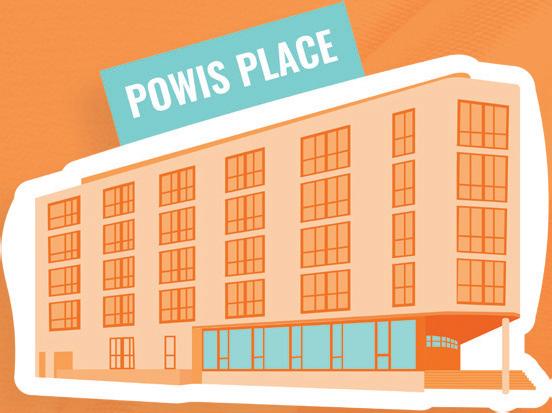







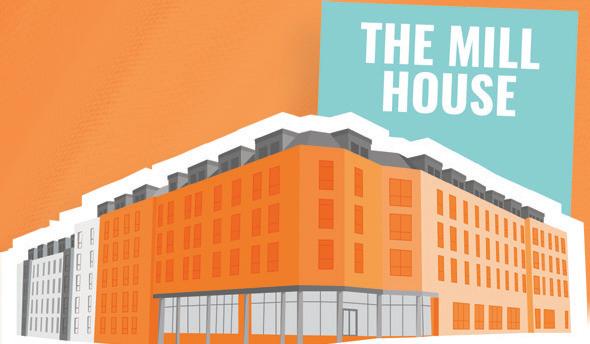







































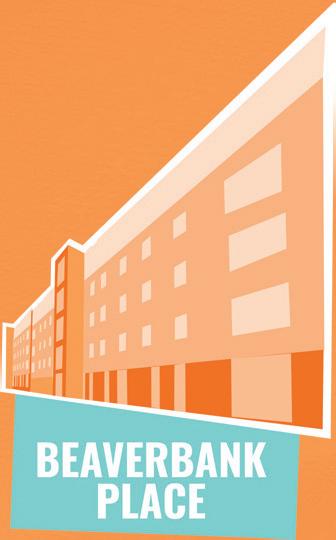












MASTERING YOUR MONEY
If you’re making the move to higher education after you finish school, it’s time to take control of your money and secure necessary student funding
FUNDING
In Scotland, course tuition fees are covered by the Student Awards Agency Scotland (SAAS). Qualifying students must have lived in Scotland their whole life or for the last three years. To be eligible for the funding, you must study on an HNC, HND, undergraduate or postgraduate course, and SAAS will only pay your tuition if you attend your classes. This is important to keep in mind if you decide to leave your course down the line: you won’t be awarded further payments and may have to repay the funding you have already been given for the year.
Students can also apply to SAAS for bursaries and student loans, but you have to do this yearly as it does not automatically renew. The amount of money SAAS will award you depends on your household income and personal circumstances. On top of the usual student loan, some students might be eligible for a bursary of up to £2,000 that they won’t need to repay. You may also qualify for an additional grant if you are on a specific course like nursing that you do not need to pay back.

SAAS also offers a variety of living cost grants for students who might require extra support or help, these include the Student Carers Grant, Dependants’ Grant, Lone Parents’ Grant and Lone Parents’ Childcare Grant. If you think you might fit into any of these categories, ensure you do thorough research to get the funding you deserve.
BUDGET
Whether you’re living at home or moving away, budgeting will be essential for the academic year. Prices are continuing to rise, which means your money won’t be stretching as far as it used to. Planning ahead, shopping smart and taking advantage of the range of discounts students are offered by companies will help you to stay on top of your bills. These aren’t just available for when you want a new gadget or wardrobe, now some supermarkets are offering them too. Free online calculators from banks like Santander, Lloyds and HSBC can help you track your income and expenses and avoid any big surprises. With the help of these handy tools, you can prepare for the month ahead and be more money-wise with a comprehensive budget.
BANK ACCOUNT
Currently, the Royal Bank of Scotland and NatWest offer all students opening a bank account a monetary reward, a four-year Tastecard giving 50 per cent off food or two-for-one meals, and discounts on entertainment and shopping. Santander does not have as large an overdraft for students as other accounts, but it does come with a free four-year railcard worth £100, which will appeal to commuting students.
DON’T WORRY ALONE
Managing your money in the current climate can be tricky and not to mention scary. But thankfully, support is available, and a range of experts are ready to help. Organisations like Money Saving Expert (www. moneysavingexpert.com) and MoneyHelper (www.moneyhelper. org.uk) have a range of tools and resources on their website that you can look at to help you budget. You can also contact your local Citizens Advice Bureau if you require more support.
www.sourcemagazine.org.uk 11
// MONEY
With the help of these handy tools, you can prepare for the month ahead
tackling THE UCAS PROCESS
From deciding on your top five courses to writing your personal statement, we’re here to help you start the UCAS process with helpful advice and information to aid you along the way GETTING STARTED
The first step in any UCAS application is to decide which courses you want to apply for and at which universities. Some people will know straight away what career and path they will take, but for others, the decision might not come so easily. Make sure you take the time to look through your options and select a course that’s perfect for you.
Further education can take many forms, and UCAS caters to most, including apprenticeships, so you will be spoilt for choice. Remember to speak to your guidance teacher if you need help sorting through your options.
DEADLINES
Applying for a university or college course is a big decision, so take your time whilst keeping any application deadlines in mind. While this is a big decision, try not to put too much pressure on yourself: if you start your chosen course and find it’s definitely not for you, you can always swap course at a later date.
The deadline for your complete application isn’t until 31 January 2024. Deadlines for medicine, veterinary and dentistry courses often differ from other degrees, so be aware of this: in these cases you’ll have to submit your application by 16 October 2023. Always double-check the deadline for each university and course when you’re applying to avoid being caught off guard.
PERSONAL STATEMENT
It might not feel natural to write an essay bragging about yourself, but it’s essential for a personal statement. Universities want to know about you, and this is your chance to show them who you are. So be bold and let your personality shine on the page by listing all of your personal

skills and achievements. Always try and relate these back to the course and use our top tips.
Start early: UCAS applications can seem overwhelming, but the sooner you start and get on with it, the easier it will be. The more prepared you are, the better!
Write down anything and everything: starting a personal statement can be a stumbling block for some, but the best thing to do is just start. You can always go back later and change your introduction, but you can’t get back the time spent staring at a blank page.
Be eager: excitement and enthusiasm shine through in an application, and universities respond well to it. There’s nothing wrong with
being keen, especially if you land an interview.
Check once, twice and thrice: don’t just double-check your application; triple-check it. You never know what mistakes you might pick up on your third check that you’ve missed before, and better yet, get someone else to check it, too.
Get personal: your application is about you, so there’s no use keeping it general, it’s time to sell yourself. Tell the university or college who you are and keep them wanting more.
FIND OUT MORE
Discover more tips and advice directly from UCAS (www.ucas.com)
www.sourcemagazine.org.uk 12
// study
Are you are ready for your next chapter?

UHI Moray is here for you.
With graduates who have gone on to work as administrators within football clubs, lecturers, personal trainers, entrepreneurs, and members of our national government, we are a different kind of institution for a unique part of Scotland.

Plus, we work closely with local employers to ensure our courses are designed to help you achieve your goals in life, work and beyond.


Discover where learning means MORE at our Open Days






+ Saturday 28 October 2023 10am - 2pm + Tuesday 7 November 2023 3.30pm - 6pm
+ Saturday 18 November 2023 10am - 2pm




moray.uhi.ac.uk/opendays

More Opportunities Real Experiences
exploring the path to college

Don’t worry: you’re not alone. We’re here to guide you through the application process, help you figure out if college is the right path for you, and to direct you to valuable resources if you aren’t quite sure yet
IS COLLEGE THE RIGHT FIT FOR ME?
The first question you might be asking yourself is whether college is the correct path for you. Well, there’s no one-size-fits-all answer. College can be an excellent choice for people who want to deepen their knowledge, specialise in a particular field, and get prepared for a rewarding career. It’s also a fantastic opportunity to meet new people, expand your horizons, and develop essential life skills. However, college is not the only path to success. You should compare this against vocational training, apprenticeships, or university to ensure you are making the right choice, but it all comes down to your passions, strengths, and long-term goals. College is often seen as the next step on the academic ladder
after school because it has a similar timetable structure and good support. Take some time for self-reflection and envision where you see yourself in the future. This will help you to determine whether college aligns with your aspirations.
UNDERSTANDING THE APPLICATION PROCESS
Once you’ve decided that college is the way to go, it’s time to tackle the application process. With a bit of organisation and preparation, you’ll navigate this journey like a pro.
Start by researching different colleges and courses. Consider factors like location, course offerings, extracurricular activities, and campus culture. Attending college fairs and open days can help you to get a feel for
what each institution has to offer. Familiarise yourself with the entry requirements for your desired courses. These may include specific qualifications, grades, and personal statements. Remember that each college may have its own set of criteria. Like when applying to university, you’ll likely have to prepare a personal statement. This is a chance to showcase your personality, interests, and passion for your chosen subject. Be genuine, highlight your achievements, and explain why you’re an ideal fit for the course.
Teachers and references play a significant role in your application process. You should choose teachers who know you well when asking for a reference, who can speak positively about your abilities, and support your ambitions.
Throughout this process stay on top of application deadlines, missing
www.sourcemagazine.org.uk 14
As you approach a crucial crossroad in your academic life, the prospect of going to college might feel both thrilling and daunting.
them can jeopardise your chances of securing a place on the course you want. Create a calendar or set reminders to ensure you submit everything on time.
After your application is submitted, some courses may require interviews. If that’s the case, practice with friends or family to gain confidence before the real thing.

LEARNING ABOUT YOUR OPTIONS
UCAS is the central application portal for higher education in the UK. Visit their website to research courses, compare institutions, and submit your applications.You can also go directly to the source. Check out individual college websites to learn more about their offerings, campus facilities, and admission requirements.
Keep an eye out for college fairs happening in your area. These events provide a fantastic opportunity to meet representatives, ask questions, and gather brochures. You should utilise any chance to connect with alumni and current students from colleges you’re interested in. They can provide reallife perspectives on college life and career prospects.
If you still aren’t sure whether this is the right path for you, seek advice from your school’s careers advisor. They can offer personalised insights and help you make informed decisions about your future.
Remember, seeking help and guidance is a sign of strength, not weakness. If you are unsure about your next steps, don’t hesitate to reach out to teachers, parents, or mentors for advice and support throughout this time. Embarking on the path to college can be the start of a new, exciting chapter.
FIND OUT MORE
Learn more about the process of applying to college through UCAS (www.ucas.com) or Colleges Scotland (www.collegesscotland.ac.uk)
www.sourcemagazine.org.uk 15
You should utilise any chance to connect with alumni and current students from the colleges you’re interested in
// STUDY












Ta king you fur the r
WHY CHOOSE AN APPRENTICESHIP
Unlike at college or university, learning during an apprenticeship happens on the job. You will receive training at your new workplace and learn through hands-on experience. In Scotland, you must be 16 or over, living in the country and not in full-time education to be eligible for a modern or graduate level apprenticeship, but if you are still in school, you could look into a foundation level apprenticeship.
Why should I become an apprentice?
An apprenticeship is a wonderful opportunity to expand your knowledge, develop new skills and earn while you learn. There are no costs to join, and
the government or your new employer will fund your apprenticeship. Throughout your training, you will receive guidance and support from your colleagues and mentor, as well as access to comprehensive training and various resources.
The practical work experience you gain from an apprenticeship will put you ahead of your competition when applying for jobs. University graduates often suffer after leaving their courses because they lack practical experience. Yet, 92 per cent of modern apprentices stay in work after they’re qualified.
Once finished, you will leave with a nationally recognised professional qualification and the necessary experience to join the working world. An apprenticeship shows employers that you are a strong, hardworking candidate – an employer’s dream applicant!
Foundation Apprenticeship
Foundation apprenticeships are available to 5th and 6th year pupils in secondary schools in Scotland. Courses will last one or two years and run around your studies for your National 5s and Highers.
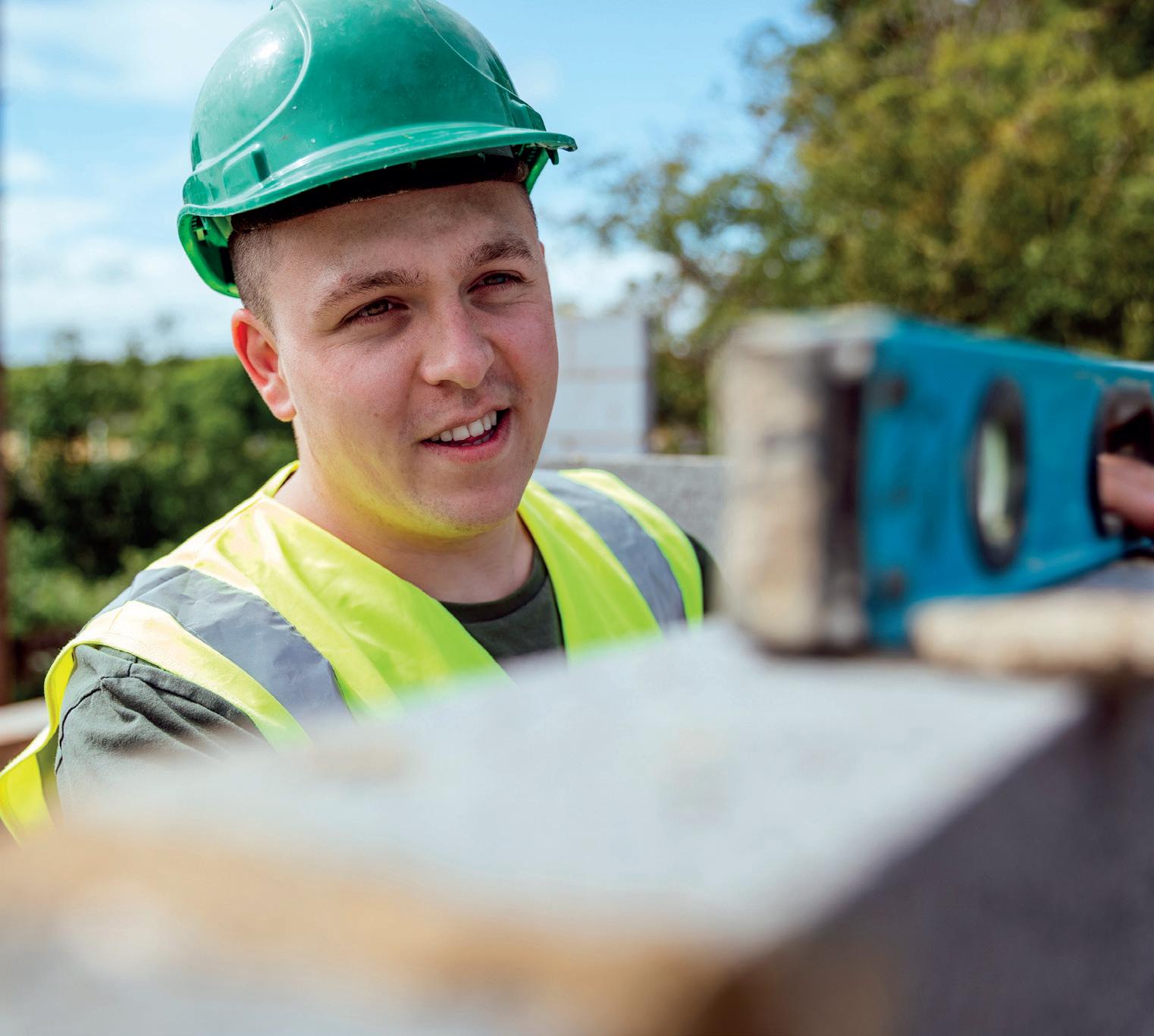
Many industries are involved in the scheme, from construction to hospitality, so there will definitely be something that appeals. You’ll need to take some time out of school to participate in the apprenticeship, and it’s unpaid, so bare this in mind. But your employers can help you apply for a modern or graduate apprenticeship afterwards which will include a salary.
Modern Apprenticeship
A modern apprenticeship is essentially a real job where you constantly develop and learn new skills. You will earn while you learn, so you must be a responsible candidate, show up on time and keep up with your colleagues. There is some studying involved, as with all apprenticeships, but if you want to do well, you must be keen and ready to put in the work. Qualifications vary depending on each apprenticeship, but you will end your time with industry-recognised credentials.
Graduate Apprenticeship
With a graduate apprenticeship, you’re getting a degree and working simultaneously. You must split your time between on-the-job training with an employer and the rest at a university. There’s no cost, but you’ll need to apply to the Scottish Awards Agency Scotland (SAAS) for funding each year, regardless of the level. Glassdoor (www.glassdoor.co.uk) found the average salary of a graduate apprentice in Scotland is over £20,000, much more than your average student is bringing in.
// work
An apprenticeship is the perfect way to earn a living while you learn specialist skills, and there’s something for everyone regardless of your stage in education
www.sourcemagazine.org.uk 17
How can I find out more?
Skills Development Scotland (www. skillsdevelopmentscotland.co.uk) is in charge of apprenticeships and has a host of information for you to read on their website. UCAS also has a helpful guide on apprenticeships and a list of opportunities throughout the UK if you wish to spread your wings a bit more.
The Scottish Apprenticeship Advisory Board will support your employer and ensure your apprenticeship runs smoothly.
How can I apply?
Generally, you will apply for a modern apprenticeship on the company’s website or through a job site. They will have a tailored application process that might include some

questions or a test. Always have your CV handy when applying for an apprenticeship.
Apprenticeships Scot (www.apprenticeships.scot) has an up-to-date database of current vacancies that will link you to the company’s page to apply.
Your local council will also have an online job board listing vacancies in your area. For example, if you’re living in the Glasgow council area, Glasgow Guarantee (www. glasgowguarantee.org) recruits all year round, and Edinburgh Guarantee (www.edinburghguarantee.org) posts vacancies in Edinburgh and the Lothians.
For graduate apprenticeships, you can contact universities close to you to see what they offer. Typically, they will have a select number of courses available with information on how to apply on their website.
Speak to your career advisor If you’re still in school and want to become a foundation apprentice. They can offer you guidance and,
in some instances, apply for the apprenticeship on your behalf.
What can I choose from?
The following industries have apprentice programmes in Scotland and are eager to work with young people like you:
• Automotive
• Accountancy
• Business Skills
• Creative and Digital Media
• Construction
• Engineering and Civil Engineering
• Financial Services
• Food and Drink Technologies
• Hardware and System Support
• Hospitality
• Scientific Technologies
• Social Services, Children and Young People
• Social Services and Healthcare
• Software Development
FIND OUT MORE
My World of Work (www.myworldofwork. co.uk) supports people in Scotland to develop their careers. Contact your local centre to arrange to speak to an advisor about your individual circumstances, or call 0800 917 8000
// work www.sourcemagazine.org.uk 18














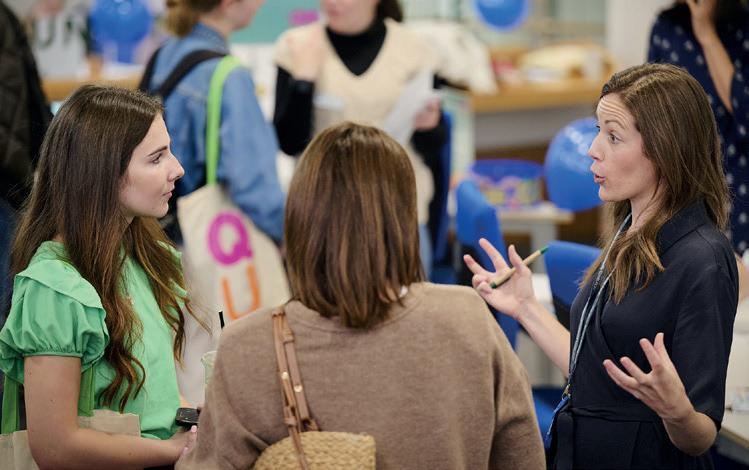
























More info: www.qmu.ac.uk Join us at our open day to gain a better insight into our range of undergraduate courses and get a real feel for studying at QMU. 28 October UNDERGRADUATE OPEN DAY 2023 Business Film, Media and Communications Health Sciences Performing Arts Psychology and Sociology Teacher Education Book your place now Join us to change your world To find out more or visit our campus: gcu.ac.uk/study/undergraduate
COPING WITH
LONELINESS
Life can sometimes feel like a rollercoaster of emotions, and one of the most challenging dips on that ride is loneliness
We all experience moments when we feel isolated and disconnected from those around us, and learning to navigate these feelings is an important part of growing up. You’re not alone in this journey, recognising the signs of loneliness, finding ways to cope, and accessing resources can help you to understand and overcome it.

RECOGNISING THE SIGNS
Loneliness can sneak up on us, affecting our mental and emotional wellbeing. Recognising the signs early can be crucial in addressing and managing these feelings. You might notice a lack of interest in activities you used to enjoy, feeling distant from your friends, changes in sleep patterns, or even physical symptoms like headaches and stomach aches. Feeling disconnected from your peers or family is a common symptom of loneliness.
REACHING OUT AND SPEAKING UP
Remember, you’re never alone in feeling like this, even if it seems like it at the time: there are people who genuinely care and want to help. If you’re feeling lonely, reaching out to someone you trust can be the first step towards feeling better. Talk to a family member, friend, teacher, or school counsellor. They can provide valuable support, guidance and help you come up with a coping mechanism or solution to how you are feeling.
Your school is also a place filled with resources to help you build connections with others, so don’t hesitate to share your feelings.
CONNECTING AT SCHOOL
Being at school offers a diverse range of opportunities to connect with others and combat loneliness. Joining clubs or sports teams can be an excellent way to meet new people who share your passions, or to find new things to do with your existing friends. Whether it’s a dance club, a chess society, or a drama group, these activities can help you find like-minded friends and provide a sense of belonging. Plus, they offer a chance to develop new skills and boost your self-confidence.
CONNECTING OUTSIDE OF SCHOOL
While school provides a bustling social environment, building connections outside of school is just as important. Consider volunteering for community projects, attending local events, or participating in workshops that interest you in your area. These activities not only help you meet new people, but can also provide a sense of purpose and accomplishment. Remember, loneliness doesn’t discriminate between school hours and personal time, so finding ways to connect beyond the classroom can be really beneficial.
EXPLORING NEW HOBBIES
Engaging in activities outside of school could also mean joining a new club or starting a new hobby. Whether it’s painting, playing a musical instrument, hiking, cooking, or even coding, exploring hobbies can lead you to like-minded individuals, or you could try something yourself: even if you feel isolated just now, filling your time with something new can help.
SEEKING SUPPORT
There are various organisations dedicated to helping young people to cope with loneliness and improve their mental wellbeing. The Young Scot (young.scot) campaign on youth loneliness provides valuable insights, resources, and stories from young people who have faced similar challenges.
Young Minds (www.youngminds. org.uk) is an incredible resource for understanding and managing your mental health. You can find advice on dealing with loneliness along with stories of young people who have overcome similar feelings on their website. The Mental Health Foundation (www.mentalhealth.org.uk) also sheds light on how loneliness affects mental health and offers guidance on improving your well-being.
The Scottish Government has
www.sourcemagazine.org.uk 20
recognised the significance of addressing loneliness and social isolation, especially for young people. Their report, Recovering Connections 2023-2026, outlines strategies to combat loneliness and improve mental wellbeing across the nation.
This initiative has a host of aims, including to build stronger communities, enhance social
connections, and provide accessible support for everyone.
The NHS Every Mind Matters site (www.nhs.uk/every-mindmatters) is another valuable resource offering tips and advice on managing loneliness. The campaign emphasises the importance of staying connected, seeking help, and maintaining good mental health.
As you navigate the twists and turns of high school life, remember that loneliness is a feeling that many people experience at some point, but just because it’s normal, it doesn’t mean you shouldn’t seek help.

With the right support and coping strategies, you can conquer these feelings and build meaningful connections that enrich your life. Reach out, engage in activities you love, explore new opportunities, and tap into the wealth of resources available to you.
OUR TIPS
Try speaking to your friends about feeling lonely, they might provide reassurance or be feeling the same way.
Think about whether something is contributing to these feelings, like stress around higher education applications or an upcoming test. Talk to someone about how you could tackle these stresses.
If you need help explaining how you feel to a friend, parent or teacher, use the resources in this feature to help.
www.sourcemagazine.org.uk 21
These activities not only help you meet new people, but can also provide a sense of purpose and accomplishment
// HEALTH
the

Do you want a purpose-driven career, one that would allow you to help create a better world for people and nature, but perhaps you’re not sure where to begin?
Our Green Jobs for Nature website is packed full of useful information about the different types of green jobs for nature, how to get one, and who you can work for.

Green jobs are more important than ever
Nature is being lost at an alarming rate in recent decades. A situation that threatens our wellbeing, food and other essential services.
The good news is that the value of nature is slowly being recognised, and with that comes a demand for people to fill the jobs that are needed to manage and restore our natural world.

ready
Visit our website to learn more about green jobs www.greenjobsfornature.org Or scan the QR code
to change
world? Are you
Set your sights on a Green Job for Nature . Get a green job as an @greenjobsfornature Adviser Conservation Worker Ecologist Environmental Educator Media and Communicati ons Coordinator Policy Officer Project Manager Researcher
TIME TO STUDY ABROAD
Every year, students across the UK travel around the world whilst continuing their studies, and you could be one of them. The government’s long-awaited replacement for the Erasmus scheme is finally up and running: here’s everything you need to know
Studying abroad can give you the opportunity to meet new people, experience other cultures and see new places while you continue your course. When Britain left the European Union, the previous scheme, Erasmus, was no longer available. Luckily, there’s still ways for you to study overseas.
THE TURING SCHEME
The UK government has launched a new programme to fund international education and training opportunities worldwide after the Erasmus scheme ended. The Turing Scheme offers you the chance to study or work abroad to gain vital international experience and boost your employability.
As a student, you will develop your skills and build lasting friendships and relationships. It’s even a chance to learn a new language, which will make you an attractive work candidate once you graduate. With over 150 possible destinations including places like the US, Japan, Canada, Thailand and South Africa, it’s also a fantastic opportunity to explore the world.
More than 3,000 Scottish students are preparing to set off this semester or next, so what’s stopping you from broadening your horizons and taking advantage of the incredible programme?
FUNDING AND SUPPORT
Much like the cost of a plane ticket, the funding you receive will depend on where you’re going and for how long. Take Spain, for example: if you were going for between four and eight weeks, you would be eligible for £120 per week. But if you were going for longer, this changes to £335 per month.
If you’re a disadvantaged student, you could be awarded a higher cost of living grant of £147.50 for up to eight weeks or £445 per month. Depending
on the distance, you might qualify to have your travel costs funded as well. Inclusion is important to the organisers, so if you’re a student with special educational needs or a disability you can still take part. There is funding available for risk assessments and more, ensuring you can do everything your peers do while you’re away.
Whilst you can participate in the Turing Scheme right now, the Scottish Government is hoping to replace this with the Scottish Education Exchange Programme. However, this new Scottish replacement for Erasmus is still in the early stages, and a pilot run isn’t expected to start until at least next year.
FIND OUT MORE
Discover more information about the Turing Scheme at www.turing-scheme.org.uk
// study
23 www.sourcemagazine.org.uk
Graduate and apprentice opportunities joinus.barclays

This programme is run on behalf of the Barclays Group which includes: Barclays Bank PLC. Registered in England and Wales (registered no. 1026167). Registered Office: 1 Churchill Place, London, E14 5HP, United Kingdom. Barclays Bank UK PLC. Registered in England (registered no. 9740322). Registered Office: 1 Churchill Place, London E14 5HP, United Kingdom. Barclays Services Limited. Registered in England (registered no. 1767980). Registered Office: 1 Churchill Place, London E14 5HP.
Picture this. You’ve just started at Barclays. You believe we shouldn’t ever settle for ‘good’. And so do the people around you. You’ve got the drive. The ideas. And the space to run with them.
To realise the downright extraordinary. This is what it feels like to have the backing of a world-class bank. Because with us, there’s more to discover. There’s more to become.
TIME TO WHY VOLUNTEER?

Volunteering, whilst charitable, is also a chance to develop your skills and learn new ones.


The opportunities you can get involved in while volunteering will be lifechanging for others and yourself. By volunteering, helping out charities and engaging with communities, you will build your confidence and acquire skills you wouldn’t have otherwise.
Becoming a volunteer is a positive experience that can provide physical and mental rewards that will benefit both you and the people you are helping. It’s likely that you’ll notice personal growth and improved self-esteem: it could even help you to figure out what you want to do next. You might even impress universities with your dedication and the skills you have developed.
Improve your employability
Volunteering is attractive to employers who look for candidates that set themselves apart. The experience demonstrates that you are proactive, committed to a sector and can work well in a team.
It’s also a chance to build your network in the industry you want to work in. For example, if you aspire to be a vet and volunteer at a shelter or help out at a kennel, there is a greater chance you will come across veterinary nurses or vets themselves and build contacts. Career contacts aside, you’ll also create relationships with people in your local community and within different organisations.





Impress a university
Universities and colleges are always looking for hobbies and experiences that make a candidate stand out. When you get hundreds of applicants a year, all fighting for a space on the same course with the same grades, it can be hard to differentiate one from another, so this can help.
Volunteering is another way to show your preferred institution why you deserve a place and how you take initiative to achieve your ambitions. Not only that, but it highlights your desirable attributes, such as empathy, passion and other career-related skills.
www.sourcemagazine.org.uk 25
// LIFE
It has many positive benefits outside of helping others that you shouldn’t shy away from
How can I become a volunteer?

Most organisations, charities and community-run projects are desperate for volunteers. There is a high turnaround in the industry and people often move on to employment or other roles.
The best way to start is to phone your local charities or organisations to find out if they need help. Most will be happy for an extra set of hands, and from there, you can sort out the rest of the details.
Bigger charities will have detailed information on their websites that will tell you how to go about applying for a position. In some cases, they might require a CV, so always have that ready to go.
Volunteer Scotland (www.volunteerscotland.net) has training and workshops to support you through the process and can signpost you to any relevant opportunities in your area. They also have an up-to-date page with the available positions throughout Scotland and can give advice. You
can find other openings across the UK with Volunteering Matters (www. volunteeringmatters.org.uk).
When should I volunteer?

All volunteering opportunities are different, so there will always be one that suits your schedule. Some organisations will only ask you to come in for a few hours or days a week, while others might require more time. Depending on what you are looking for, there might also be the chance to travel abroad and make a difference elsewhere. It’s always worth asking if a role can be adapted to your schedule, after all, you are giving your time to help so places might be happy to be flexible.
Where should I volunteer?
If you’re unsure where to start, in Scotland, you can volunteer with your local Girl Guides (www.girlguiding.

org.uk) or Scouts (www.scouts.org. uk) by applying on their website. Both troops have units throughout the nation and will gladly accept any offers of help. Although not careerfocused, you will still develop skills and impress employers.
The Dogs Trust (www.dogstrust. org.uk) and Guide Dogs UK (www. guidedogs.org.uk) are also great organisations to support, especially if you plan on working with animals. These charities are popular with puppy lovers from all over, so whilst they desperately need the help, they might be unable to accommodate placements immediately. If you fancy something different, consider volunteering abroad. Many charities are looking for help in third-world countries and would be delighted to have you. Raleigh International (www. raleighinternational.org) has a volunteering scheme that allows young people to make a difference in developing countries and broaden their horizons. Likewise, Lattitude Global Volunteering (www. lattitudecanada.org) will send young adults aged 17 to 25 on international placements that last three months to a whole year.
If you are struggling to find a local volunteering position, try checking to see if your city has an online record of vacancies. In Glasgow, Volunteer Glasgow (www.volunteerglasgow.org) lists all current places on their page and can advise you on opportunities in the area. Similarly, Volunteer Edinburgh (www.volunteeredinburgh.org.uk) has a database of charities looking for help to make the process easier.
www.sourcemagazine.org.uk 26 // LIFE















STUDENTS IN CRISIS
Every year, students fight to secure somewhere to live, with many failing to find anything before the start of term. This year, the situation has been amplified by the cost-of-living crisis as students can’t afford to pay over the odds for rent

www.sourcemagazine.org.uk 28
ACCOMMODATION
College and university students in Scotland are once again facing an accommodation crisis as they look for suitable housing across the country. Campaigners are blaming the lack of purposebuilt student (PBS) accommodation for the rising number of homeless students: studies show that 12 per cent of Scottish undergraduates have been homeless at some point because there is not enough private housing.
Ellie Gomersall from NUS describes the situation as horrifying, with nearly one in eight students having been homeless while in education.
“I think last year, it went past a tipping point where people really started paying attention to it because so many of the issues were far more acute last year,” highlights Ellie. “It’s been a recurring problem for years now, and it’s just been so difficult.
“We have this huge issue where institutions are increasing the number of students that they are offering places to, but they’re not taking responsibility for making sure those students have somewhere to live.”
NUS is asking for universities and colleges in Scotland’s biggest cities to co-ordinate and take charge of the crisis.
GUARANTEE
“We’ve been calling for a student housing guarantee,” explains Ellie. “If an institution is increasing the number of students they’re offering places to, well, then the onus is on them to ensure that sufficient accommodation is available for those students.
“It’s really simple, but apparently, it’s too much to ask universities to make sure there are enough homes for the students they are offering places to.”
In some areas, guaranteeing accommodation could be impossible due to insufficient housing. Data from StuRent revealed that in Glasgow, students booked out almost all PSB accommodation before the end of the first term last year.

With six student institutions in Glasgow and around 185,000 undergraduates, the city has naturally been hit hard by the crisis. Last year, stories of students who had to commute from as far as Paisley made the news while other students sofa-surfed until they found somewhere to stay. One university even had to ask students to defer for a year if they couldn’t find housing.
IMPOSSIBLE
Ilaria Pomectu, an international student from Italy, had to stay with her course mate and her
family for two months before she managed to find accommodation in Pollokshaws. Not only did she have to pay a hefty deposit to secure the flat, but it took her an hour on the bus - which often didn’t turn up - to get to the University of Strathclyde where she studies each day.
“I was lucky because if I couldn’t stay with my friend, I would have had to pay for a hotel, which, as a student, is quite impossible,” stresses Ilaria. “In a perfect world, I would not have accepted the accommodation, but as students, I don’t think we can be picky. Unfortunately, we have to accept we won’t get a nice place for cheap.”
This year, she has found accommodation in Glasgow’s city centre, but it wasn’t easy and the search left her feeling anxious and alone.
“I don’t feel my university helped me much to find a flat,” admits Ilaria. “They referred me to a website page explaining the renting process, but it was quite useless as the issue was actually finding one to rent.
“Honestly, I’d say that looking for a flat was way more stressful than choosing my masters dissertation project.”
QUALITY
Whilst the crisis is heightened for international students who have to pay thousands to attend a university and, often, an arm and a leg for somewhere to stay, it is also of particular concern for students from a deprived background.
“Students in the most disadvantaged positions are disproportionately affected because they can’t afford to just pay whatever to secure a home,” offers Ellie. “And of course, even when students do find somewhere to live, they often arrive and there’s huge amounts of mould and its poor quality; in some cases the buildings are even crumbling.”
NUS has been campaigning for comprehensive rent controls which will protect students from landlords who are hiking up their prices to capitalise on the urgency of the market and young people who are desperate for somewhere to live, but at this moment, students are still at the mercy of property owners.
Ellie explains that whilst the situation is unfair, it is currently the unchanging reality for Scotland’s students.
If you are looking for accommodation next year, start your search early to ensure you can find somewhere to live before your course starts and utilise the resources and advice available so that you can prepare.
FIND OUT MORE
To find out more about your rights and what help is available, visit the NUS Student Renters Hub: www.nus.org.uk
// LIFE
www.sourcemagazine.org.uk 29
UNWIND AND RECHARGE
Life as a high school student can be demanding, with studying, extracurricular activities, and your social life all needing your attention. Amidst the hustle and bustle, it’s vital to find moments to relax and recharge. There’s a whole host of ways that you can unwind outside of school, listening to podcasts, adding meditation into your routine or sitting down with a good book are just a few of our favourites.
PODCASTS
Podcasts are a gateway to exciting stories, informative discussions, and intriguing ideas. When you need a break from your studies, consider tuning in to podcasts that spark your curiosity and ignite your imagination. The Student Experience offers relatable stories from fellow students worldwide, making you feel connected to a larger community. For a dose of inspiration the Ted Talks Education series features powerful talks on education, innovation, and personal growth.
MEDITATION
Navigating the challenges of high school can sometimes feel overwhelming. Meditation provides a valuable tool for managing stress and reducing any anxiety you have about the future. Taking just a few minutes each day to practice mindfulness can make a significant difference in your well-being. Apps like Smiling Mind and Insight Timer offer guided meditation sessions tailored to your needs, helping you embrace a sense of calm even when it feels near impossible.
NEW BOOKS
With the arrival of autumn and winter, there’s no better time to lose yourself in the pages of a compelling book, especially with so many new releases coming up. We recommend heading to your local book shop, or
their website, and reading blurbs to see what genre you are interested in before making any purchases. You could even put time in your calendar to read and make it a new habit.
SEEKING SUPPORT
Navigating the last few years of school can be emotionally challenging. Various organisations are dedicated to helping young people cope with stress and mental health. Youth Scotland (www.youthscotland. org.uk) offers a wide range of youth development programs and support services that promote mental wellbeing. YoungMinds (www. youngminds.org.uk) is another invaluable resource providing expert advice and a crisis messenger service for people in need of urgent help. Remember, reaching out for support is a positive step towards better mental health.
FINDING BALANCE
As you go through high school, your education is paramount, but so is your wellbeing. Striking a balance between academic pursuits and personal time is key to a fulfilling and successful future. Embracing moments of relaxation will not only rejuvenate how you’re feeling, but also enhance your focus and productivity when it’s time to hit the books again.
Whether you choose to listen to podcasts, practice meditation to find your inner calm, escape into captivating books, or seek support during challenging times, remember that taking care of yourself is vital.
As the rest of the school year unfolds, make a conscious effort to incorporate relaxation into your routine. By doing so, you’ll find yourself better equipped to navigate the exciting challenges that lie ahead.
// PLAY
School can be stressful, especially if you are in your last few years with pressure to think about your next steps
www.sourcemagazine.org.uk 30








For more information Call 0345 600 3222 Visit royalnavy.mod.uk/careers SCAN TO FIND OUT MORE DON’T DO THE EVERYDAY, EVERY DAY Part-time opportunities available Why Royal Naval Reserves? • Play a key role in supporting Royal Naval operations • Membership of the Armed Forces Pension Scheme • Paid leave proportionate to attendance • Tax-free annual bounty for training commitment • Extra pay if you’re mobilised • Travel all around the world ROYAL NAVAL RESERVES RECRUITING NOW “Alexa, ask the Royal Navy about...” ASK ALEXA
Studying National Qualifications this year?
If you are studying a National 1 – National 5, Higher or Advanced Higher course and need additional support because of a disability or additional support need, speak to your teacher or lecturer about assessment arrangements.
Assessment arrangements are adjustments that can be made to enable learners who are disabled and/ or those with additional support needs to access an assessment and demonstrate the relevant knowledge, skills and understanding of the course.
sqa.org.uk/assessmentarrangements





































































































































































































































































































































































